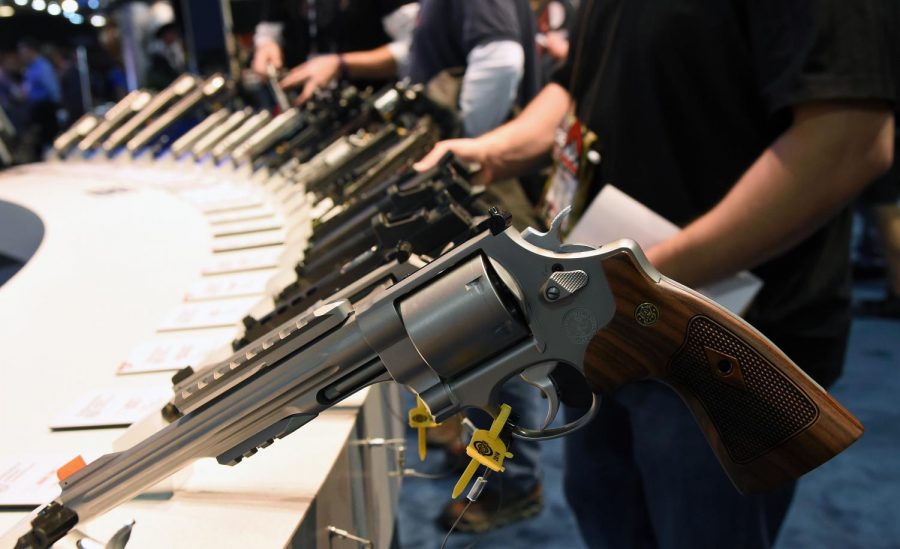Firearms in America
November 27, 2017
In Sutherland Springs, Texas, on November 5th, 2017, around 11:20 AM, Devin Patrick Kelley entered the First Baptist Church armed with a semi-automatic assault rifle. With 26 deceased and 20 injured, a town of 600 and a nation of 300 million shuddered from the terror.
In an era where the phrase ‘deadliest mass shooting’ is a part of everyday life, once again firearms and legislation concerning them are called into question. This year’s seemingly endless streak of gun violence has only amplified Americans’ divisive discourse. There’s no question firearms are embedded in our culture. However, there is no excuse for the inextricable violence we’ve seen in just the past five or six years.
Since 9/11, foreign terrorist organizations have killed 404 Americans. In the same timeframe, Americans have killed over 440,000 Americans – more than died in the entire Second World War. Based on averages of the past five years, Everytown Gun Research estimates 90 Americans will die from gun violence or related causes every single day in the U.S.
Are these deaths simply the reality of what comes with the freedom to bear arms? Evidence shows otherwise. Germany, with one of the highest rates of guns-per-capita worldwide, also boasts one of the lowest rates of gun-related deaths. It also has some of the strictest gun laws found in the world today.
In Germany, to obtain a license to own a firearm, one must undergo a series of tests ranging from knowledge about guns to background checks that include a history of mental illness. For those under the age of 25, an additional psychiatric evaluation must be completed. In contrast, background checks in the U.S. are only required for in-store purchases of guns, allowing one to easily bypass this protection through purchasing at gun shows, person-to-person, or even online.
Even with background check access is restricted to those convicted and sentenced to more than two years or deemed mentally unstable by a court. As evident by the recent shooting at a church in Texas, those with a history of domestic violence and other concerns can go unreported in the database.
What separates other high-income countries from the U.S. is that, in the wake of mass shootings, comprehensive legislation is pushed through in these countries to reserve access to reasonable firearms for law-abiding citizens only. It seems the only action our representatives are collectively willing to take is to offer their thoughts and prayers for the victims.
The NRA has adopted the strategy of blocking any legislation involving the sale, distribution, or restriction of firearms from passing, misrepresenting not only the average American but even the average gun owner. A survey conducted in early 2017 from Pew Research Center found 83% of Americans support universal background checks, and 68% support banning assault rifles. The NRA pours $3 million dollars on average annually into the pockets of our representatives to prevent gun control legislation the American public desires from being passed.
“I think the NRA’s influence is dangerous, and that the message they promote is harmful to the average American” commented Senior Maggie Stoffer.
Recently, an attorney representing the relations of the victims of the Sandy Hook shooting in 2012, which resulted in the deaths of 26 students and staff, argued that gun companies deliberately market military weapons in such a way as to appeal to the violent tendencies of citizens. The semi-automatic rifle AR-15, with its larger magazine capacity and lower recoil, is marketed with its militaristic history in mind and has since become the favored weapon of mass shooters from Sandy Hook, Las Vegas, Orlando, and Texas.
Earlier this year, Congress, under pressure from the NRA, reversed two of President Obama’s key legislative initiatives on guns: restrictions for those on the no-fly-list and the mentally unstable.
When the safety of civilians is secondary to profit in the eyes of legislators, gun companies, and organizations such as the NRA, a compelling campaign is needed to divert attention away from the cause of such tragedies.
The NRA claims gun control would sacrifice freedom and punish law-abiding citizens, and believe the ultimate goal of gun control is to take away all guns. To members of the NRA, gun control would be an infringement on their second amendment rights and would prevent efforts to organize a militia to overthrow the government – should the need ever arise.
Are these fears true? Will sweeping gun legislation be at the cost of liberty and freedom? Again, international awareness provides an answer. In Australia, in late April 1996, Martin Bryant killed 35 and wounded 23 in an event dubbed The Port Arthur Massacre. Since then, Australia has implemented wide-ranging gun legislation with high success — chances of dying by gunshots have decreased by 50%. Their culture still recognizes handguns and shotguns – just not assault rifles.
“I would feel safer with a more effective system that could regulate who could buy a gun and what weapons are available for purchase, people don’t need military grade weapons,” commented Senior Maggie Stoffer.
Other students at Oakdale agreed with Stoffer.
“I used to be all for the Second Amendment and no government regulation, but in light of recent events I don’t think people should be able to have assault weapons,” remarked Senior Ryan Orzechowski.
For many, the lack of protection against preventable gun violence is the most devastating infringement on the freedom and right to life.





























